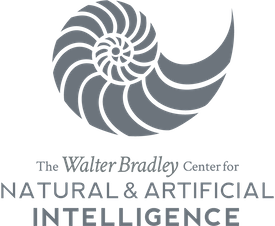 What’s hot.what’s not. And what’s rot. From David Klinghoffer at ENST:
What’s hot.what’s not. And what’s rot. From David Klinghoffer at ENST:
—
The Walter Bradley Center for Natural and Artificial Intelligence will focus on the profound concerns stirred by the mystery of minds. Join us in Seattle on Wednesday, July 11, as we launch the Bradley Center with a special public conversation at Seattle’s William Allen Theater at the Museum of Flight. It’s FREE, from 7:30 to 9:30 pm. We require that you register here to save your place.
The topic for the evening: “Will the Machines Take Over? Human Uniqueness in the Age of Smart Machines.”
Computers vastly outperform humans in executing calculations. But in any meaningful sense, can they host minds? Has technology revealed the emptiness of the traditional idea of a soul? Is the advance of artificial intelligence to be welcomed or feared? Does AI liberate human energy? Or will it put vast numbers of us out of jobs, and enslave the rest with deliberately hypnotic, addictive products?
Does it threaten our privacy and autonomy? Or even worse? Stephen Hawking and others have seen in AI nothing less than a looming catastrophe for humankind, necessitating an embrace of “some form of world government” as the only defense against extinction.
The Bradley Center will address all this and more. The Center honors the intellectual legacy of Discovery Institute Fellow Walter Bradley, who has served as a distinguished and decorated professor of engineering at Baylor University and Texas A&M. Dr. Bradley helped sparked a revolution in scientific thinking with the 1984 book he co-authored, The Mystery of Life’s Origin: Reassessing Current Theories [1984, free download]. He will be the guest of honor for the evening.
Dr. Bradley will be joined by the Center’s new director, Robert J. Marks, Distinguished Professor of Electrical and Computer Engineering at Baylor University; mathematician, author, and entrepreneur William Dembski; neuroscientist Michael Egnor of Stony Brook University; and Microsoft data scientist George Montañez.
Dr. Marks and his colleagues will outline the goals of the Center, introduce staff and fellows, and engage the audience in a provocative discussion.
This development could hardly be more timely. The threats, promises, and limits of artificial intelligence, impossible to separate from the enigma of natural intelligence, stir awe, fear, and hope like few others subjects in our culture. The matter is a constant media preoccupation. There is a vast need for rational consideration. And it cannot be left to the media with the latter’s interest in scaremongering, or to tech giants seeking to accommodate us to a future that may be in their interest, but not ours.
The Bradley Center will have a major role in educating the public and challenging scholars. We hope you will join the conversation at its launch next month!
—
Note: I (O’Leary for News) am going and will write about it.
See also: Artificial intelligence: Self-driving cars are oversold, says researcher
Artificial intelligence pioneer laments current AI limitations, promises machines with free will and morality
and
Henry Kissinger: The End of the Enlightenment dawns, due to artificial intelligence